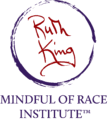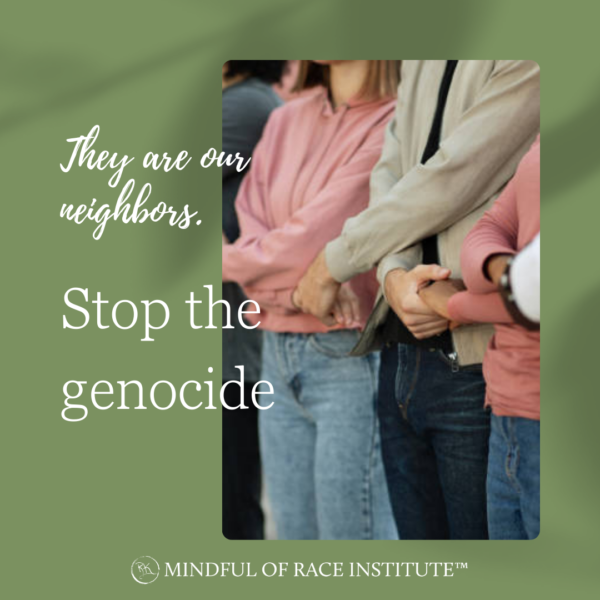There is a genocide occurring of innocent people in Gaza, not to mention in many parts of the world. Have you noticed? Can you feel it? Then what?
What’s happening in Gaza is horrific and, sadly, not new nor is it uncommon to see greed, hatred, and delusion manifest at a raw and vile extreme through cooperative power and supremacy. It’s about race, it’s about history, it’s about the right to belong, and it’s about creating a healing response.
This soul loss and injustice represent a spiritual urgency that calls us to question the idea of our shared humanity. Is it shared? At what cost? This real-time and painful crisis calls us to deepen our understanding, expand self-awareness, broaden perspectives, and to take wise action. No one has all-inclusive answers, but perhaps, if we haven’t already, we can begin by taking a few steps.
Take Care of Yourself
How are you relating to this genocide? How much do you understand about it? Are your convictions about what is happening shutting you down or blocking a broader perspective? Mindfulness meditation serves as a vital tool to pause and soften into a deeper understanding of your relationship to the racial horrors of our time. Rather than reactionary measures or attachment to views, you learn to settle and tend to your thoughts and emotions with care. You gain insight into your internal processes and habits of mind that support both harm and healing. With practice, you cultivate forbearance, enabling a greater capacity to respond to racial complexity with greater ease, comprehension, and impact.
Despite the temptation to react, you can notice your impulses and rewire your nervous system to ride the waves of intense emotion and confusion until you settle into a clearing that supports an appropriate response. To support this practice, listen to our free webinar: Let’s Talk About Race: How to deal with emotional distress.
Take Care of Each Other
Invite one or two people to join you in exploring these social horrors with curiosity and care. Breaking silence, sharing how we are impacted, and discussing ways to support and respond are vital to resilience and a felt sense of belonging. You may not be able to solve the problems, but you can be heard and supported, and feel more connected while deepening your understanding. Gathering with such intention is a powerful intervention, as it establishes a felt sense of belonging and a foundation for wise and collective action. We benefit from each other’s oops, ouches, and good-heartedness, and we plant wholesome seeds that will bloom in service to our collective wellbeing. To support this practice, take our online course: Six Hindrances to Racial Harmony.
Take Care of our World
A wise person once said: They may not live next door, but they are your neighbors. The bottom line: Genocide must stop! Again, warfare is nothing novel, though undeniably savage. It’s a systemic power disease intertwined with the unconscious, nuanced, and emboldened ways we have been conditioned to perceive and impact each other and the planet in our daily lives.
How we vote and how we serve has a wide-ranging impact on the daily lives of many near and far. How aware are you of your impact? Our actions and choices must reflect an aspiration of global wellbeing. War is also not solely outside of ourselves. Our warring thoughts and actions are seeds of consciousness and should be recognized, questioned, and redirected to ensure wholesome blooms. To support this practice, reflect on the Seven Questions posted by poet and musician Joy Harjo, from “For those who would govern.”
- Can you first govern yourself?
- What is the state of your own household?
- Do you have a proven record of community service and compassionate acts?
- Do you know the history and laws of your principalities?
- Do you follow sound principles? Look for fresh vision to lift all the inhabitants of the land, including animals, plants, elements, all who share this earth?
- Are you owned by lawyers, bankers, insurance agents, lobbyists, or other politicians, anyone else who would unfairly profit by your decisions?
- Do you have authority from the original keepers of the lands, those who obey natural law and are in the service of the lands on which you stand?
These times may feel overwhelming and, granted, we may never fully understand the complexity of war, but we are not powerless. We are responsible for the world and this planet, not just for our own comfort, fears, or needs. We can be committed to eliminating hate within ourselves and in our actions. We must make it our business to understand our interdependence and be judiciously informed of how the global power systems of hatred function in order to have an immediate, broad, and generational impact on care and healing. This is both challenging and necessary.
When mindfulness becomes our focus and our medicine, we can experience a profound sense of belonging, allowing us to stay present and true to our core values and virtues. This dedication nurtures our ability to interact with the world while remaining rooted in the recognition of our shared humanity and the essential principle of non-harm.
~ Ruth King
Afterword: Please read my post on Why I Said Genocide

